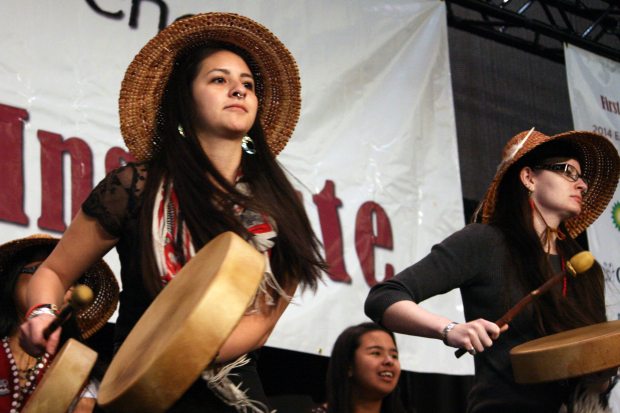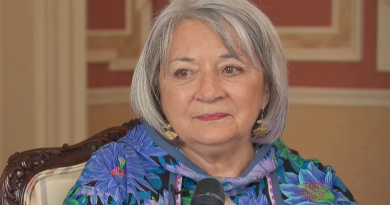Alaska bill to be signed recognizing indigenous languages as official state languages

If the legislation to recognize 20 Alaska Native languages as official state languages was wrought with emotion, the ceremony to turn the bill into law with the governor’s signature is fraught with politics.
Gov. Sean Parnell had been set to sign House Bill 216 on Thursday at the start of the Alaska Federation of Natives convention in Anchorage, the biggest Native gathering of the year with an anticipated 5,000 attendees.
That will still happen — sort of.
Parnell still gets 20 minutes, starting at 9:30 a.m. Thursday, to address the entire convention in the third-floor main ballroom. But the signing ceremony won’t happen during his speech the way Parnell and bill backers planned. Rather, it will take place after his address in a smaller separate room one floor down while the convention continues on, said AFN president Julie Kitka.
Kitka said that the signing ceremony was morphing into something bigger than the time allowed.
“It seems like it took on a life of its own on social media, with people inviting other people and so on,” Kitka said. The AFN agenda is tight, with two top Obama administration officials among those scheduled for Thursday and many speakers just getting 10 minutes to talk.
“We thought the most respectful thing to do is allow the governor to give his report on the state and allow a bigger opportunity in a separate room to go on as long as they need to,” Kitka said.
The ceremony was bumped from the main convention hall after a Tuesday meeting of the AFN board.
Some board members didn’t like that the governor waited so long to begin with.
Venue
With the general election less than two weeks away and Parnell up against a ticket that includes former AFN president Byron Mallott as the lieutenant governor candidate, some on the board considered Parnell’s selection of the AFN venue sheer political opportunism.
But one of the bill’s prime sponsors, a Republican who is part Alaska Native, countered that there’s no better time or place for action on a measure that means so much.
The legislation does not create any new requirements for translation but is deeply symbolic. It elicited impassioned testimony in legislative committees, strong floor speeches by legislators, and a demonstration in a Capitol hallway to force a vote before it passed April 20, Easter Sunday, on what was supposed to be the last day of this year’s legislative session.
“It passed in April,” said Georgianna Lincoln, an AFN board member and former state senator originally from Rampart. “One half a year later he wants the signing at the AFN convention? Now isn’t that politics?”
If Parnell really backed the bill, he should have signed it already, Lincoln said. “But don’t put on a big show.”
The language bill is the lone measure passed this year still awaiting action by the governor.
History of bill
The bill hasn’t been sitting on Parnell’s desk all this time. His office was working with House Speaker Mike Chenault to time when the bill would be formally transmitted from the Legislature, as is standard. Once it is delivered, he has 20 days to act. The language bill was delivered Oct. 15, starting that clock. Until a bill is sent over from the Legislature, there’s no deadline for the governor.
While it’s unusual for a bill to sit for months before heading to the governor’s desk, it has happened in the past, said Suzi Lowell, chief clerk of the House.
State Rep. Charisse Millett, R-Anchorage, joined with Democrats including Rep. Jonathan Kreiss-Tomkins of Sitka as a prime sponsor of the bill.
She said backers and the AFN agreed in early August to have the signing at the convention in what she still hopes will be a joyous occasion.
AFN “was really receptive,” she said. “It’s not a stretch to say AFN is probably the best and the broadest audience that we are ever going to have for a bill like this.”
She’s disappointed with the second-tier room but said the celebration will go on. Elders and Native speakers of most if not all the 20 languages plan to be at the ceremony.
“This is bigger than any one political figure. It is bigger than any one political race,” Millett said.
Celebration of languages
At this week’s First Alaskans Institute Elders and Youth Conference – the precursor to AFN – the bill was acknowledged as important. It was too important to be part of a political stunt, said some. It was so important that it deserved a big audience, said others.
“Our languages expressly identify our environment, our world, our universe, our way of thinking, our way of being, our opinions, our happiness,” said Ole Lake, a Yup’ik speaker originally from Hooper Bay who lives in Anchorage now.
The signing should already have happened, away from the suggestion of politics, he said.
Jill “Kaasteen” Meserve, 23, is originally from Hoonah but now lives in Juneau and was among those at the Capitol in the spring to support the bill.
She also wondered why the governor delayed signing it for so long but said AFN provides “the perfect opportunity. We’ve got people from villages all over the state. We’ve got elders who could be here to witness it.”
Rep. Kreiss-Tomkins, who carried the bill, said he just wanted to mark the moment.
“All I care about … is a celebration of these languages and a celebration of the people who made a Herculean effort to get it through the Legislature. It was truly amazing,” he said.
The measure adds these Native languages to what had been an official list of one, English: Inupiaq, Siberian Yupik, Central Alaskan Yup’ik, Alutiiq, Unangax, Dena’ina, Deg Xinag, Holikachuk, Koyukon, Upper Kuskokwim, Gwich’in, Tanana, Upper Tanana, Tanacross, Hän, Ahtna, Eyak, Tlingit, Haida and Tsimshian.
It passed the state House 38-0, with two members absent. The vote was 18-2 in the Senate, with Fairbanks Republican Sens. John Coghill and Pete Kelly the lone “no” votes.
Contact Lisa Demer at LDemer@alaskadispatch.com or on Twitter
Related stories from around the North:
Canada: Losing their Words (Video documentary), Eye on the Arctic
Finland: English language dominance worries language teachers in Finland, Yle News
Sweden: Foreign language speakers overtake number of Sámi and Swedish-speakers in Finland, Yle News
United States: Judge orders state to add language help for voters in Alaska villages, Alaska Dispatch



